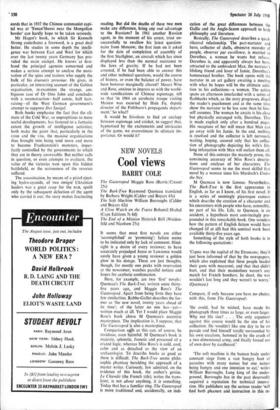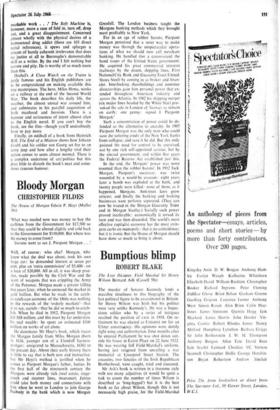NEW NOVELS
Cool views
BARRY COLE
The Gasteropod Maggie Ross (Barrie/Cresset 25s) The Bark-Tree Raymond Queneau translated by Barbara Wright (Calder and Boyars 45s) The Soft Machine William Burroughs (Calder and Boyars 42s) A Close Watch on the Trains Bohumil Hrabal (Cape Editions 7s 6d) The End of a Mission Heinrich Boll (Weiden- feld and Nicolson 25s)
It seems that most first novels are either 'accomplished' or 'promising'; failure seems to be indicated only by lack of comment. Hind- sight is a desire of every reviewer; to have accurately prejudged Joyce or Lawrence would surely have given a young reviewer a golden glow in his dotage. These are just thoughts, though, for mostly one pecks with reservation at the newcomer, watches parallel notices and hopes for aesthetic confirmation.
Here, for 'example, are two 'first' novels: Queneau's The Bark-Tree, written some thirty- five years ago. and Maggie Ross's The Gasteropod. Apart from being firsts they have few similarities. Robbe-Grillet describes the for- mer as 'the new novel, twenty years ahead of its time'; of the latter no one has—yet- written much at all. Yet I would place Maggie Ross's book above M Queneau's eccentric masterpiece. The implication is, I suppose, that The Gasteropod is also a masterpiece. Comparison syeh as this can, of course, be invidious, even ha`rmful. M Queneau's book is majestic, splenetic, frenetic and possessed of a crazed logic, whereas Miss Ross's is cold, cool, calm and as detached as the view of an archaeologist. To describe books as good as these is difficult. The Bark-Tree seems philo- sophic phantasy heralding the approach of a master writer. Curiously, few admitted, on the evidence of this book, the author's genius. Le Chiendit (the French title), writes the trans- lator, is not about anything, it is something. Today that has a familiar ring. The Gasteropod is more traditional and, accidentally, an indi-
cation of the great differences between the Gallic and the Anglo-Saxon approach to both philosophy and literature.
Basically, The Gasteropod describes a quad- rilateral relationship. The part-narrator and hero, collector of shells, obsessive recorder of people, observer par excellence, is married to Dorothea, a woman he wants but refuses. Dorothea is, and apparently always has been, attracted to the ambivalent Max, the narrator's lifelong friend and lover of Jamie, Dorothea's homosexual brother. The book opens with the narrator in an art gallery awaiting a meeting with what he hopes will be the ultimate addi- tion to his collections—a woman. The action spans an afternoon interlarded with a series of flashbacks which, as the story progresses, dispel the reader's puzzlement and at the same time show the narrator to be less sane than he him- self assumes. The woman he awaits is his close but physically estranged wife, Dorothea. This is made explicit only after a hundred pages. His recapture of her will mean that Max can go away with his Jamie. In the end, nothing is resolved and the collector is left nervously waiting, hoping, assured only that his collec- tion of photographs depicting his wife's life- long infatuation with Max will outlast them all.
None of this conveys the masterly prose, the convincing accuracy of Miss Ross's descrip- tions and analyses of her characters. The Gasteropod seems to me the most skilful first novel by a woman since Iris Murdoch's Under the Net.
M Queneau is now famous. Nevertheless, The Bark-Tree is the first appearance in English, as far as I know, of his first novel. It is a series of seemingly picaresque cameos which describe the creation of a character and his encounters with people who have, ostensibly, no part of his life. Life, to Queneau, is an accident, a hypothesis most convincingly pro- pounded in this remarkable book. One wonders how the pattern of English fiction would have changed (if at all) had this seminal work been available thirty-five years ago.
Something of the style of both books is in the following quotations: 'Capita was the capital of the Etruscans; they'd just been informed of that by the newspapers, which also explained that these people loaded their' guns with macaroni, and that that didn't hurt, and that their mandolines weren't any match for French bombers. In short, the war wouldn't last long and they weren't to worry.' (Queneau.) Compare, if only because you have no choice, with this, from The Gasteropod:
'He could, had he wished, have made his photograph three times as large, or even larger. Why not life size? . . . The only argument against this course would be the size of his collection. He wouldn't like one day to be on parade and find himself totally- surrounded by his own creations, hemmed in by the crush of a two dimensional army, and finally forced out of own door by cardboard.'
'The soft machine is the human body under constant siege from a vast hungry host of parasites with many names but one nature being hungry and one intention to eat,' writes William Burroughs. Long king of the under- ground, Burroughs has in the past deservedly acquired a reputation for technical innova- tion. His publishers say the serious reader 'will find both pleasure and instruction in this re- _
marble work . . The Soft Machine is, howiwer, more a case of fold in, turn off, drop out, and a great disappointment. Concerned
almost wholly with the physical desires of a homosexual drug addict (there are 103 direct rectal references), it spews and splurges a stream of barely coherent irrelevance that does no justice at all to Burroughs's demonstrable skill as a writer. By the end I felt nothing but sorrow and pity. He is worthy of so much more than this.
Hrabal's A Close Watch on the Trains is justly famous and his English publishers are to be congratulated on making available this tiny masterpiece. The hero, Milos Hrma, works on a railway at the end of the Second World War. The book describes his daily life, the weather, the almost unreal war around him, and culminates in his parallel acquisition of both manhood and heroism. There is a humour and seriousness of intent almost alien to the English novel. If you can't buy the book, see the film—though you'll undoubtedly have to pay more.
Finally, an oddball of a book from Heinrich Boll. The End of a Mission shows how Johann Gruhl and his soldier son Georg set fire to an army jeep and how after a lengthy trial their action comes to seem almost normal. There is a complex undertone of art/politics but this does little to disturb the book's neat and some- times raucous humour.







































 Previous page
Previous page